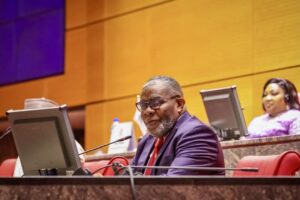
Donkor, represented by the bank’s Director of Research and Strategic Planning, MacDonald Goanue, said that EBID had within 26 years positioned itself as the financial backbone of the ECOWAS region.
He reaffirmed the institution’s commitment to regional development through its strategic investments in infrastructure, energy, health, agriculture, education, and digital transformation across West Africa.
“In 2024 alone, the Bank approved 10 new projects worth UA 330. 76 million (439.74 million dollars) and appraised 21 additional projects,” he said.
Donkor said the bank’s key flagship initiatives included connecting electricity networks between Mali and Côte d’Ivoire; solar electricity of 750 community facilities in Benin; and construction of a vital bridge linking AIBD to Blaise Diagne Airport in Senegal.
He said that EBID also boosted Medium, Small and Micro Entrepreneurs (MSMEs) financing, supported public-private partnerships, especially in agro-processing and manufacturing, among others, across the ECOWAS subregion.
“The number of projects benefiting from disbursements increased from 56 in 2023 to 77 in 2024.
“The annual loan disbursement rate was approximately 20.54 per cent in 2024, slightly down from 21.58 per cent in 2023,” he said.
The bank’s president stressed that the partnership between EBID and the Ecowas Parliament was essential to realising a stable, prosperous and integrated sub-region.
He also disclosed that Nigeria is the largest shareholder in the regional financial institution, with approximately 33 per cent of total shares, followed by Ghana and Ivory Coast, respectively.
Donkor said that Nigeria would soon give an additional 100 million dollars capital contribution to EBID, which he described as a reaffirmation of its strong commitment to regional economic integration and development.
He said, “Nigeria is the biggest contributor. Nigeria is in the process of even paying 100 million dollars to the bank.
“We finance private projects in Nigeria. The Bank of Industry is our client. We have done business with commercial banks and so on, so, we do a lot in Nigeria.
“Ghana has paid its second tranche; Côte d’Ivoire is doing very well,” he said.
The bank’s president also disclosed that the Indian government availed it about one billion dollars facility to fund infrastructure, energy, transport, and private sector development across West Africa from 2006 till date.
Donkor further explained that EBID is not a commercial bank, and does not take deposits, adding that its operations relied mainly on Member States’ contributions and international financing facilities.
Mr MacDonald Goanue, EBID’s Director of Research and Strategic Planning, during the interactive session at the parliament’s plenary on Thursday in Abuja
The community parliamentarians took turns to commend the bank for its great contributions to regional development and also sought clarification on specific projects that had been implemented, as well as their sustainability and strategies.
They also offered constructive recommendations aimed at improving transparency, strengthening monitoring mechanisms, and ensuring that development financing was more inclusive.
NAN also reports that the EBID is a leading regional investment and development bank owned by all the ECOWAS Member States, and was established in 1999 with headquarters in Lome, Togo.
The bank currently supports key development projects in all ECOWAS countries, focusing on energy, transport, infrastructure, agriculture, and health, among others, while expanding its footprint and deepening regional integration.



